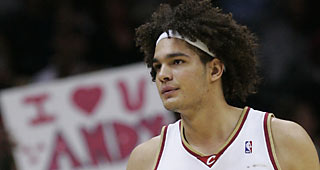Anderson Varejao went from high-energy, valuable Cavaliers defender/flopper to cautionary tale, but he might have also become the face of the next Players' Association cause. Jonathan Feigan of the Houston Chronicle writes.
Varejao held out through the summer, preseason and first month of the season, finally settling on a three-year, $17.4 million offer from the Bobcats.
Because he was a restricted free agent, the Cavaliers did not have to get in a bidding war and matched the offer. He will almost certainly opt out after two seasons, earning about $11 million, less than he could have gotten with one phone call.
"I'm happy to be back in Cleveland and grateful to the Bobcats for their offer because that helped to get this deal done," Varejao said. "I got what I wanted, so now let's forget what happened [during the negotiations] and move on."
But he is not alone. No restricted free agent changed teams this offseason, with the term "restricted free agent" having become an oxymoron. So while Varejao seemed to be a case of a player's obstinacy or an agent's ? Dan Fegan ? hubris backfiring badly, to the Players' Association it could be the problem with the system.
"It makes me question the concept when a player has a difficult time getting somebody to make an offer," Players' Association director Billy Hunter said. "When you hear complaints that a player should just sit around and wait for his team to make an offer, I'm obviously concerned about that."
"To me, that's one of the things we should talk about going forth in the next round of bargaining, restricted free agency. They aren't free agents if no one gets an offer because teams believe the offers will be matched. All of the leverage is with the team."
"It makes it difficult for the guy who is not a superstar, for a guy like Varejao who is a very good player, to get a competing offer. It's something we have to look at."
The current collective bargaining agreement runs through the 2010-11 season, with the NBA holding an option to extend it for another season, so nothing will change soon. But if restricted free agents continue to play in no-win situations, the union will likely try to change the rules.


